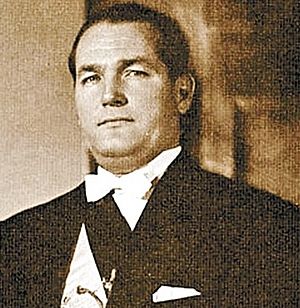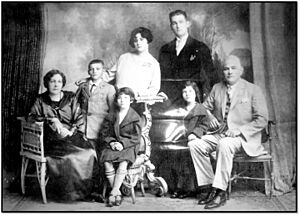Juan José Arévalo facts for kids
Quick facts for kids
Juan José Arévalo Bermejo
|
|
|---|---|

President Arévalo during his inauguration
|
|
| 24th President of Guatemala | |
| In office 15 March 1945 – 15 March 1951 |
|
| Vice President | Vacant (1945-1948) Mario Monteforte (1948-1949) Vacant (1949-1951) |
| Preceded by | Juan Federico Ponce Vaides |
| Succeeded by | Jacobo Árbenz Guzmán |
| Personal details | |
| Born | 10 September 1904 Taxisco, Santa Rosa |
| Died | 8 October 1990 (aged 86) Guatemala City |
| Nationality | Guatemalan |
| Political party | Revolutionary Action Party |
| Spouse | Elisa Martínez Contreras (m. 1925-1955) |
Juan José Arévalo Bermejo (born September 10, 1904 – died October 8, 1990) was a professor and thinker. He became Guatemala's first democratically elected president in 1945. This happened after a big public uprising against the leader Jorge Ubico, which started the Guatemalan Revolution. Arévalo was president until 1951. During his time, he survived 25 attempts to remove him from power. He chose not to run for president again in 1951, instead handing power to Jacobo Árbenz. As president, he brought in many new social programs. These included raising the minimum wage and starting programs to teach people how to read and write. He also helped create a new constitution for Guatemala in 1945.
Contents
Arévalo's Presidency and Reforms
Juan José Arévalo served as President from March 15, 1945, to March 15, 1951. He was elected in 1944 in what many consider the first truly fair election in Guatemala's history. Arévalo won with more than 86 percent of the votes. This was more than four times the votes of all other candidates combined. It is still the biggest win margin for a free election in the country.
During Arévalo's six years in office, political life was much freer than before. Arévalo was an educator and a philosopher. He understood that people, communities, and countries needed to grow and improve. Before becoming president, Arévalo was a university professor living outside Guatemala. He came back to help rebuild the country after the old government was removed. He especially focused on social security, which helps people with money when they are sick or old. He also helped write a new constitution that gave people civil rights and freedoms they had never had before.
His ideas, called "spiritual socialism" or Arevalismo, were about freeing the minds of people in Latin America. After World War II, the governments of the United States and other countries misunderstood his ideas. They thought Arevalismo was communism, which caused worry and fear. Some leaders in nearby countries, like Anastasio Somoza García, also supported this view.
During his presidency, many foreign-owned lands that were not being used for farming were taken and given to farmers. Landowners also had to provide good homes for their workers. Many new schools, hospitals, and houses were built. A new minimum wage was also started.
In Guatemala's cities, new worker groups (labor unions) were formed. New laws helped workers in cities, especially those in the lower and middle classes. Many political parties and trade unions were created. Giving more people the right to vote was a very important part of his time in office. However, these benefits did not reach the rural farming areas as much. There, old traditions of large land estates, called latifundia, were still very strict and unfair to farmers.
The government tried to improve the civil rights of rural farmers (campesinos). But conditions in the countryside could not get better without big changes to land ownership. This was called agrarian reform. It meant giving land to farmers in a fair way. Not fully achieving this was a weakness for Arévalo's party in Congress and for his government. His successor tried to fix this with Decree 900.
Arévalo was followed by Jacobo Árbenz Guzmán. Árbenz continued the land reform ideas of Arévalo's government. Arévalo willingly gave up his presidency to Jacobo Árbenz in 1951. This was the second democratic election in Guatemala's history. After Árbenz was removed from power in 1954, open democracy did not return to Guatemala for thirty years. Arévalo went to live in Mexico as a university professor and writer. On March 27, 1963, he returned to Guatemala to announce he would run for president again. However, the leader at the time, Miguel Ydígoras Fuentes, was removed from power. Enrique Peralta Azurdia then took control, and Arévalo had to leave the country again.
What Was "Spiritual Socialism"?
Juan José Arévalo was known as a strong supporter of democracy and his country. He called his political ideas "spiritual socialism." This idea focused on helping Guatemalans grow morally and "free people psychologically." Arévalo, who was the main thinker behind the revolution, believed his ideas were key to building a peaceful and growing society in Guatemala. He thought that governments could create an ideal society by letting citizens have freedom in their opinions, property, and way of life. He believed that protecting people's freedom would make them support the government. This would then keep everyone safe, both as individuals and as a group.
"Arevalismo" stressed that civil freedoms were very important for human development. However, it also said that "Individual liberty must be used within the rules of social order." Arévalo believed that democracy needed some limits on civil rights if individual freedoms went against national security or what most people wanted. This might seem confusing, but Arévalo did not agree with older ideas of "classical liberalism" for Guatemala. Because he rejected these Western ideas and seemed to lean towards socialism, some conservative newspapers called him a communist.
Arévalo did not agree with Marxism, which focuses a lot on money and goods. He said that "Communism is against human nature." His "spiritual socialism" was actually against communism. This was clear because Arévalo stopped several communist-influenced activities in Guatemala. He sent some communist activists out of the country. He also refused to make the Communist Party of Guatemala legal. He removed government workers who were linked to a communist newspaper and closed down a Marxist teaching center.
Even with these actions, Arévalo faced almost 30 attempted coups (attempts to illegally take power) from the Guatemalan military. This was because they thought he was too sympathetic to communists. He once told the U.S. Congress, referring to World War II, "I fear the West has won the battle, but in its blind attacks on social welfare will lose the war to fascism."
Arévalo wanted the 1944 revolution to create a modern social democratic society. This meant changing from old, feudal ways to a democratic socialist system. Arévalo's ideas emphasized that the government should get involved in economic and social matters. He believed this was needed to meet the desires of most people. Unlike Marxism, Arévalo valued property rights. But he believed they should be used to benefit all of Guatemala if necessary. Overall, Arévalo wanted to improve the lives of working people by changing how the economy worked. Because of his ideas, the Catholic church and the military often disliked him. He faced at least 25 unsuccessful attempts to remove him from power during his presidency.
"Arevalismo" was seen as a popular movement that was against strong authoritarian rule. Its main goal was to free Guatemala from being too dependent on more developed countries.
Family Life
During his presidency, Arévalo was married to Elisa Martínez. He later had a relationship with Alaíde Foppa, and they had a son named Julio Solórzano Foppa. At the time of his death, he was married to Margarita de Leon and had five children.
His Writings
He wrote a powerful story called "The Shark and the Sardines," published in 1956. In 1963, he published another book called "Anti-Communism in Latin America."
See also
 In Spanish: Juan José Arévalo para niños
In Spanish: Juan José Arévalo para niños
 | Chris Smalls |
 | Fred Hampton |
 | Ralph Abernathy |


